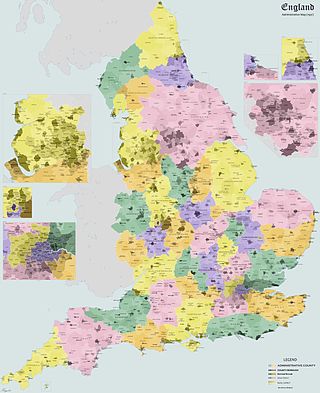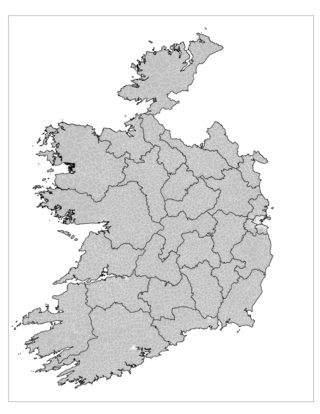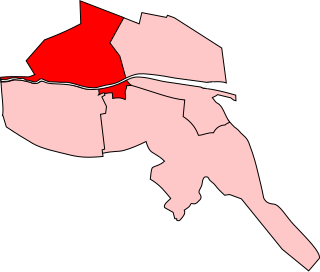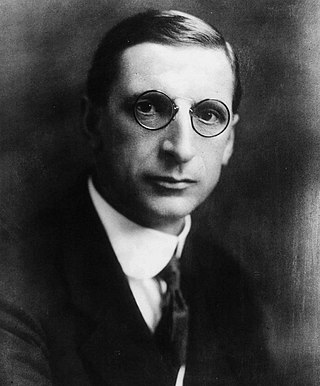An alderman is a member of a municipal assembly or council in many jurisdictions founded upon English law. The term may be titular, denoting a high-ranking member of a borough or county council, a council member chosen by the elected members themselves rather than by popular vote, or a council member elected by voters.

The Local Government (Ireland) Act 1898 was an Act of the Parliament of the United Kingdom of Great Britain and Ireland that established a system of local government in Ireland similar to that already created for England, Wales and Scotland by legislation in 1888 and 1889. The Act effectively ended landlord control of local government in Ireland.

A municipal borough was a type of local government district which existed in England and Wales between 1835 and 1974, in Northern Ireland from 1840 to 1973 and in the Republic of Ireland from 1840 to 2002. Broadly similar structures existed in Scotland from 1833 to 1975 with the reform of royal burghs and creation of police burghs.

The Representation of the People Act 1948 was an Act of the Parliament of the United Kingdom that altered the law relating to parliamentary and local elections. It is noteworthy for abolishing plural voting for parliamentary elections, including by the abolition of the twelve separate university constituencies; and for again increasing the number of members overall, in this case to 613.

An electoral division is a legally defined administrative area in the Republic of Ireland, generally comprising multiple townlands, and formerly a subdivision of urban and rural districts. Until 1996, EDs were known as district electoral divisions in the 29 county council areas and wards in the five county boroughs. Until 1972, DEDs also existed in Northern Ireland. The predecessor poor law electoral divisions were introduced throughout the island of Ireland in the 1830s. The divisions were used as local-government electoral areas until 1919 in what is now the Republic and until 1972 in Northern Ireland.
Historically, the single transferable vote (STV) electoral system has seen a series of relatively modest periods of usage and disusage throughout the world; however, today it is seeing increasing popularity and proposed implementation as a method of proportional representation and a goal of electoral reform. STV has been used in many different local, regional and national electoral systems, as well as in various other types of bodies, around the world.
Shankill, a division of the parliamentary borough of Belfast, was a UK parliamentary constituency in Northern Ireland. It returned one Member of Parliament (MP) to the House of Commons of the United Kingdom from 1918 to 1922, on the electoral system of first past the post.
St Michan's, a division of the parliamentary borough of Dublin, was a parliamentary constituency which returned one Member of Parliament (MP) to the House of Commons of the United Kingdom from 1918 until 1922, using the first past the post electoral system.. From 1918 to 1921, it was also used as a constituency for Dáil Éireann.

College Green, a division of the parliamentary borough of Dublin, was a parliamentary constituency which returned one Member of Parliament (MP) to the House of Commons of the United Kingdom from 1885 until 1922. From 1918 to 1921, it was also used a constituency for Dáil Éireann
Cork Borough was a parliamentary constituency represented in Dáil Éireann, the lower house of the Oireachtas, from 1921 to 1969. The method of election was proportional representation by means of the single transferable vote (PR-STV).
Thomas Scanlan was an Irish barrister and nationalist politician. He was Member of Parliament (MP) for North Sligo from 1909 to 1918, as a member of the Irish Parliamentary Party in the House of Commons of the United Kingdom.

Sligo–Mayo East was a parliamentary constituency represented in Dáil Éireann, the lower house of the Irish parliament or Oireachtas from 1921 to 1923. The constituency elected 5 deputies to the Dáil, on the system of proportional representation by means of the single transferable vote (PR-STV).
The 1985 Irish local elections were held in all the local government areas on Thursday, 20 June 1985.

The Elections and Registration Act 1915 was a war time act of the Parliament of the United Kingdom that postponed local elections and the preparation of registers of electors. Initially the postponement was for one year, but the Act was renewed annually until the electoral cycle was resumed in 1919 following the cessation of hostilities.
In Ireland, the term city has somewhat differing meanings in Northern Ireland and the Republic of Ireland.

Elections were held in January and June 1920 for the various county and district councils of Ireland. The elections were organised by the Dublin Castle administration under the law of the then United Kingdom of Great Britain and Ireland (UK), and held while the Irish War of Independence was pitting UK forces against those of the Irish Republic proclaimed in 1919 by the First Dáil. Elections were held in two stages: borough and urban district councils in January; and county and rural district councils in June. Sinn Féin, which had established the First Dáil, won control of many of the councils, which subsequently broke contact with Dublin Castle's Local Government Board for Ireland and instead recognised the republican Department of Local Government. The election results provide historians with a barometer of public opinion in what would be the last elections administered on an all-island basis: the Government of Ireland Act 1920 passed at the end of the year effected the partition of Ireland from 1921, though the elections for the two home rule Parliaments envisaged by it were held on the same day; No further elections would be held simultaneously across the island of Ireland until 1979, when representatives of the Republic of Ireland and Northern Ireland to the European Parliament were elected. The next local elections were held in 1924 in Northern Ireland and in 1925 in the Irish Free State.

The 1920 Dublin Corporation election took place on Thursday 15 January 1920 as part of that year's Irish local elections. 80 councillors to Dublin Corporation were elected from 10 borough electoral areas on the system of proportional representation by means of the single transferable vote (PR-STV) for a five-year term of office.
Elections to the Cork Corporation took place on Thursday 15 January 1920 as part of that year's Irish local elections.

Thomas (Tom) Deignan was a Commandant of the Irish Republican Army in the Irish War of Independence, politician and veteran of World War I. He fought on the Anti-Treaty side in the Irish Civil War. After the war he entered local politics until his death.

The Local Government (Ireland) Act 1919 is an Act of the Parliament of the United Kingdom of Great Britain and Ireland which provided that local government elections in Ireland would be conducted on a system of proportional representation by means of the single transferable vote (PR-STV). This replaced the previous system of first-past-the-post in single-member districts and block voting in multi-member districts.









